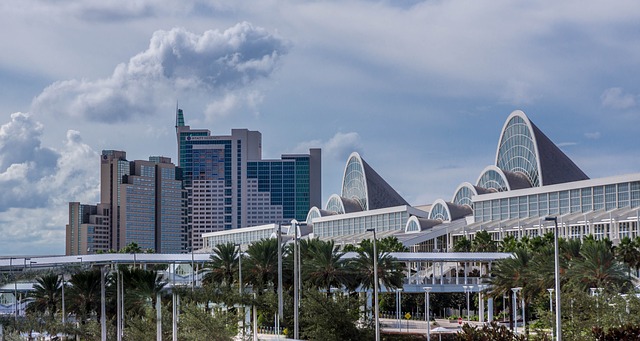MY REFLECTIONS ON THE GENERAL CONFERENCE
By: Frank G. Tunstall
I have returned home rejoicing at the work of the Holy Spirit in the General Conference in Orlando.

Orlando, Florida | pixelbay.com Creative Commons
My first General Conference was 1961 in Richmond. Emmanuel’s President W. G. Drum sent me on a train as a freshman college student to make a speech representing Emmanuel College. I’ve attended all of them since – I think this one was number 15.
Two conclusions have leaped out at mewith this General Conference. The first is the peace that was in the conference in the elections and in the adoption of the By Laws. Remembering conferences that were anything but peaceful, especially in the 1970’s and 80’s, makes this sense of peace all the more satisfying.
The second is the ministry of the speakers Presiding Bishop Doug Beacham invited. To me, the common focus of each of them, and especially the evening speakers turned out to be prophetic proclamation, without any prior consultation between them.
- If I never hear again a prophetess walk for an hour in the prophetic, I saw Beth Moore do it Wednesday evening as she challenged IPHC to reclaim its “holy fire.” I thought I was hearing a prophetess in the grand apostolic tradition of Phillip’s daughters (Acts 21:9).
- The altar service Wednesday evening also lasted for an hour. With great compassion and spiritual hunger Bishop Beacham led the worshippers in prayer and praise, and lingered doing it even when other duties called for his presence. His heart for revival showed clearly and reflected his yearning for Pentecostal renewal.
- Samuel Rodriquez, president of the National Hispanic Leadership Conference and pastor of a church in Sacramento, California, was the Thursday evening speaker. He preached from John 5 and challenged the IPHC family to rise up and walk, from the story of Jesus healing the 38-year paralytic at the Pool of Bethesda. Pastor Rodriquez took prophetic preaching to a level I have never witnessed in my lifetime of ministry.
- Bishop Beacham’s sermon Friday evening was prophetic too as he challenged IPHC to be a movement of fruitful church planters in the U.S., with churches in every state and every major city in the U.S. [The two remaining states are Rhode Island and Wyoming.) He also called for claiming new territory, growing from the present 100 countries overseas, to ministry in 150 countries in the next fifteen years.
- The two morning speakers were also profound. John Dawson, international president of Youth with a Mission, prophesied that IPHC is “a doorway to the nations.” Ed Stetzer, a missiologist, church growth expert and Senior Fellow of Wheaton College’s Billy Graham Center, challenged the delegates with statistics that show evangelical churches in America are growing, and certainly not dying, although some mainline denominations are in decline. He called on IPHC by affirming “planting new churches is the best way to reach people who may consider themselves Christian but have no real relationship with God.”
It all said to me that it is in the mind of the Holy Spirit to give IPHC a rebirth of Pentecostal, prophetic ministry. If it took apostles and prophets to lay the foundation of the Lord’s church, then apostles and prophets are needed in every generation to keep the church from drifting away from its foundation.
May the Lord deliver us from a mindset that celebrates our Pentecostal heritage as a history lesson, but does it without the vibrant anointing of the Holy Spirit in contemporary experience.
The church needs the manifestation gift of prophecy (1 Corinthians 12:7-11). It also needs people whom the Spirit gifts, anoints, and sets in place in the ministry of prophet (Ephesians 4:11-12). A rebirth of prophetic ministry among us will certainly require judging with spiritual discernment, but this conference has said to me that the Spirit is calling us to prophetic renewal. It is of great interest in my thinking that both Beth Moore and Samuel Rodriquez came from outside our “tribe.” My sense was that without any prior discussion between them, they each spoke prophetically, even though neither of them probably would think of themselves as functioning in the spiritual ministry of prophet.
As I have prayed and pondered this, I have an additional sense that each of our church colleges, as well as our conference Schools of Ministry should make place for teaching that can help raise up prophetic ministry. At a minimum prophetic ministry should be built into the existing curricula, even if it is not made a new stand-alone course.
Of course, the Holy Spirit will not call every pastor to be a prophet, but every pastor and all church leaders should be taught to respect and make place for New Testament prophetic ministry, even if prophets make mistakes from time to time.
Matthew Helland’s book, Prophesy and Heal the Sick would be a good starting place.
